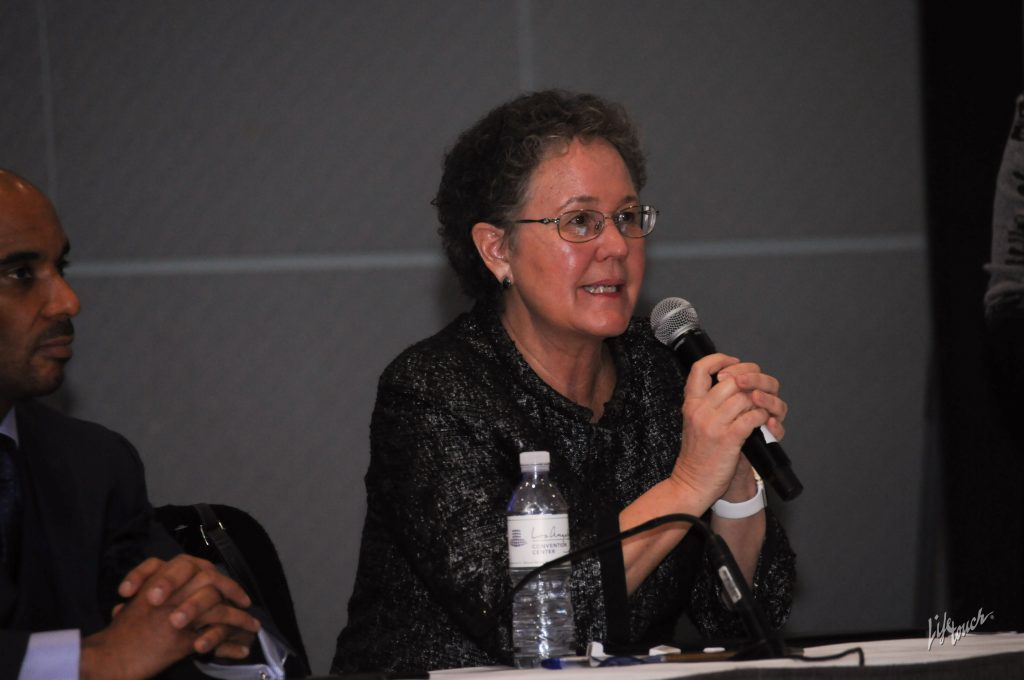If America wants to be the world leader in education, then it should look to other countries as a model for success, says Linda Darling-Hammond, a leading educational researcher, in her Thought Leader session Thursday at the AASA national conference.
Countries such as Finland and Singapore have been among the highest-scoring countries in international comparisons. Unlike the United States, these countries provide broad support for children’s welfare, said Darling-Hammond, president and CEO of the Learning Policy Institute in Palo Alto, Calif.
“They take care of children. Health care is usually universal. There is income security and (state-paid) preschool,” she told a room full of superintendents, education advocates and business leaders at the AASA conference. In effect, those countries educate “the whole child,” she said.
Darling-Hammond was the keynote speaker for the AASA Sobol Lecture, named for the late New York education leader Thomas Sobol, a vehement supporter of equity in education and for involving parents and teachers in policymaking decisions affecting classrooms. Sobol passed away in 2015.
With more than 25 books and research articles on education, Darling-Hammond is influential in policymaking circles. Once rumored to be a potential candidate to lead the U.S. Department of Education during the Obama administration, Darling-Hammond this week was named by Gov. Gavin Newsom to lead the California State Board of Education. The board’s responsibilities range from school financing to testing requirements and teaching standards. She is the first African-American woman to take the helm.
Darling-Hammond noted that economic conditions for many families and schools nationwide worsened in the post-No Child Left Behind policy era, particularly in the wake of the 2007 Great Recession. Wages stagnated. Poverty is on the rise and more families are homeless now, she said. Such factors contribute to poor educational outcomes.
The Bush administration’s No Child Left Behind policy, passed by Congress in 2002, increased testing requirements for schools nationwide and set penalties for schools that failed to demonstrate improvements in student achievement, she contended. Proponents then said the policy would hold teachers, schools and school districts accountable for closing gaps in student achievement, or they would risk federal funding cuts or even closure of failing schools.
The fallout is apparent. Schools began testing children more frequently. They music, art and even recess — despite neuroscientific research demonstrating that they are critical for a child’s emotional and social development, Darling-Hammond said.
“If all of that testing had been improving us, we would have been the highest achieving nation in the world,” she said.
Darling-Hammond said educating the whole child requires not only academic services and programs, but a safe school climate where kids do not feel stigmatized for their differences or fearful for their lives.
Her comments gave fellow panelist Luvelle Brown, superintendent of New York’s Ithaca City School District and author of Culture Of Love, an opportunity to call on educators to recognize that past educational approaches have perpetuated oppression for some children — those who are poor or who are ethnic minorities.
“Conflict is inevitable,” Brown said. “We need to facilitate conflict in ways that are constructive and productive. We need to stop calling each other ‘out,’ and start calling each other ‘in.’”
Gail Pletnick, immediate past president of AASA, said the future of education is guided by three “new R’s”: redesign, redefine and reimagine.
“We need to really be concentrating on the whole child,” Pletnick said, “not on the tests and not on the past to go forward into the future.”
(Emily Gersema is a senior communications specialist at UCLA and a reporter for AASA’s Conference Daily Online.)


